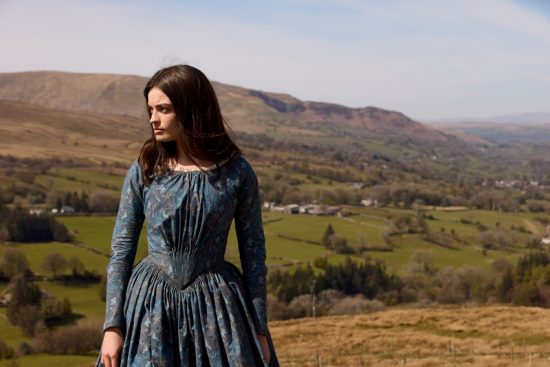Review: Emily – “Stunning visuals of the Yorkshire countryside”

The middle of three surviving sisters in her family, which also includes published writers Charlotte and Anne, Emily Brontë became famous for writing Wuthering Heights. The novel was first published in 1847 under the pseudonym Ellis Bell, since at the time of course it would have been inappropriate for a woman to write such a book. She died a year later, never knowing that her book would become a literary classic, nor that she would find generations of fame for its pages.
So one cannot blame actor Frances O’Connor (Mansfield Park, TV’s Mr. Selfridge amongst many credits) for being interested in the author. She makes her directorial debut with Emily, for which she also penned the screenplay. The film makes no claims to being biographical, though it does use a few known facts about Brontë to anchor the imagined story of the writer’s life.
For a fictionalized version though, Emily doesn’t push boundaries, feeling relatively tame despite a somewhat forbidden romance between its titular character played by Emma Mackey (Sex Education) and a handsome clergyman, William Weightman (Oliver Jackson-Cohen). Considering the scandalous nature of the relationship between Wuthering Heights’ characters Catherine and Heathcliffe, the love story of Emily and William feels a little uninspired.
What their relationship does do however is give Emily a bit more focus, gives the audience something to root for. Until this point, we really see Emily telling stories with younger sister Anne (Amelia Gething) or trying to follow in the teacher footsteps of older sister Charlotte (Alexandra Dowling). The real love of Emily’s life, her kindred spirit, is her older brother Branwell (Fionn Whitehead) whom she joins on many mischievous adventures around their town in Yorkshire. She seems to admire his rebellious nature, his ability to emote and create. She joins him atop a hill yelling “Freedom in thought!” at the top of their lungs, a phrase she later writes upon her arm to match her sibling’s tattoo.
Emily is unable to get the approval of her reverend father, who seems constantly disappointed in her. Indeed the entire town sees her as ‘the strange one,’ as Charlotte brazenly informs her. She is ever haunted by the death of her mother, ever stifled by the environment that continues to confine her, even as she is submersed in the Yorkshire countryside, wide and open.
O’Connor, along with cinematographer Nanu Segal, does make Emily look beautiful, making those Yorkshire hills a character all their own, even despite the rain that so frequently dampens their splendour. Accompanied by a beautiful score from Abel Korzeniowski, a mix of instrumental and choral work, Emily has the feel of a typical large-scale period epic. Yet despite excellent performances including a very game Emma Mackey, Emily just feels like it’s not terribly memorable for all its well-constructed pieces. For an imagined version of Brontë’s story, it doesn’t take full advantage of its artistic license.
O’Connor here tries to create a groundwork of inspiration for the author’s greatest work, though concentrating on the romance between Weightman and Brontë, instead of the family itself, seems more a cinematic decision; something that might have been expected instead of something that fit in with the true spirit of Emily. Surely this love story, which follows the typical pattern of most romances, is lovely and well-executed. But, while not true to real life, the film needn’t suggest that Brontë required such a relationship to motivate and influence Wuthering Heights. Instead, there was plenty of inspiration to be found in the characters that did exist within the Brontë home, and all the intricacies of their relationships.
At the end of Emily, Charlotte admonishes her sister’s crowning achievement, “It’s an ugly book, full of selfish people that only care for themselves.” Emily simply replies, “Good,” knowing she has created exactly what she set out to write, and that a feeling of freedom was best achieved through this expression. These moments between the siblings truly highlight Emily’s essence – the push and pull between her and Charlotte, the love and rebellious nature she shares with Branwell – this is where Emily truly shines. That story explored further, amongst the stunning visuals of the Yorkshire countryside, may have been more compelling, may have been where the spirit of Brontë and her work truly lies.

Emily is in North American theatres starting February 17, 2023.









